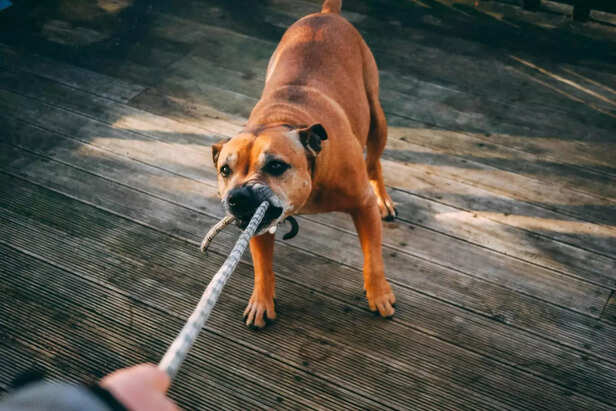Is Your Pet Depressed? These 5 Warning Signs Could Mean Trouble
Nikita Kanyal | Apr 16, 2025, 23:24 IST

( Image credit : Pexels )
Think your pet is just “having an off day”? Think again. Depression in pets is very real—and it might already be affecting your furry friend. From skipping meals to ignoring toys, the signs are subtle but serious. If your dog or cat suddenly sleeps all day, clings to you like glue, or hides away for hours, it could mean emotional trouble. This isn’t just about mood swings it’s a silent cry for help. Discover the 5 shocking signs of pet depression that most owners miss until it’s too late. Your pet could be suffering in silence… don’t ignore the red flags!
We often think of pets as little bundles of joy tail-wagging, purring, zoomie-chasing balls of happiness. But here’s the truth most pet parents overlook: animals can suffer from depression too. And unlike us, they can’t tell you they’re sad. They show it—in subtle, heartbreaking ways that are easy to miss.
If your fur baby has been acting "off" lately, don’t brush it off as a mood swing. These 5 signs could mean your pet is silently struggling, and it’s time to pay attention.

Pets live for food. Whether it’s a squeaky toy-shaped treat or their usual dinner bowl, most dogs and cats are always down to chow. So if your pet suddenly starts ignoring their food, it’s not just picky behavior it could be a sign of emotional distress.
Loss of appetite is one of the first things vets ask about when evaluating for depression. If your pet is not eating, don’t wait—something’s wrong.

Yes, pets nap a lot. Dogs can snooze up to 14 hours a day. Cats? Sometimes 18. But there’s a big difference between resting and withdrawing. If your once-active pet now barely moves from their bed or seems too tired to play, it might be more than just laziness it could be emotional exhaustion.
When even belly rubs don’t excite them, it’s time to be concerned.
Some pets react to sadness by becoming extra needy following you from room to room, whining when you leave, or refusing to be alone. Others go the opposite way, hiding under beds, avoiding eye contact, or retreating to dark corners.
Either way, these behavior shifts mean your pet is trying to tell you something’s wrong.

Has your usually chill dog growled at you lately? Or has your purring kitty suddenly started scratching without warning? Sudden aggression isn’t just a discipline issue it can be a cry for help.
A pet in emotional pain may lash out unexpectedly. If this isn’t normal for them, don’t punish—investigate.
Pets are creatures of joy. A bouncing ball, a squeaky toy, a sniff-filled walk—these are the highlights of their day. So if your dog shrugs off their leash or your cat ignores their favorite mouse toy, something deeper may be going on.
Just like humans, depressed pets lose interest in things they once loved. If your fur baby no longer lights up at the sound of their toy bin, it’s not normal it’s a warning sign.
If your pet is showing two or more of these signs, it’s time for a vet check-up. Depression in pets can be triggered by things like:
The vet may suggest behavioral therapy, lifestyle changes, or in some cases, medication. But the first step is you noticing the signs.
Your pet can’t say “I’m sad.”
They can’t ask for help.
But their behavior is speaking loud and clear if you know how to listen.
If your pet seems off, don’t wait. Show them love, patience, and get help if needed. Because depression doesn’t just hurt humans—it hurts our animals too.
Discover expert advice and the latest tips on pet care, training, health, and more. Stay updated with all things pets at Times Pets!
FAQs
If your fur baby has been acting "off" lately, don’t brush it off as a mood swing. These 5 signs could mean your pet is silently struggling, and it’s time to pay attention.
1. Loss of Appetite—Skipping Meals? That’s a Red Flag

Loss of Appetite
( Image credit : Pexels )
Pets live for food. Whether it’s a squeaky toy-shaped treat or their usual dinner bowl, most dogs and cats are always down to chow. So if your pet suddenly starts ignoring their food, it’s not just picky behavior it could be a sign of emotional distress.
What to watch for:
- Skipping meals for more than a day or two
- Ignoring favorite treats
- Losing interest in water
2. Sleeping All Day—Lazy or Low in Spirit?

Sleeping All Day
( Image credit : Pexels )
Yes, pets nap a lot. Dogs can snooze up to 14 hours a day. Cats? Sometimes 18. But there’s a big difference between resting and withdrawing. If your once-active pet now barely moves from their bed or seems too tired to play, it might be more than just laziness it could be emotional exhaustion.
Signs to look for:
- Sleeping more than usual
- Ignoring toys or walks
- No reaction to your voice or affection
3. Clinginess or Hiding—Extreme Behavior Changes
Some pets react to sadness by becoming extra needy following you from room to room, whining when you leave, or refusing to be alone. Others go the opposite way, hiding under beds, avoiding eye contact, or retreating to dark corners.
What this could mean:
- Clingy pets might be anxious or afraid of being abandoned
- Withdrawn pets could be shutting down emotionally
4. Aggression or Sudden Mood Swings—The “Snappy” Red Flag

Aggression
( Image credit : Pexels )
Has your usually chill dog growled at you lately? Or has your purring kitty suddenly started scratching without warning? Sudden aggression isn’t just a discipline issue it can be a cry for help.
Emotional causes of aggression:
- Depression
- Anxiety
- Past trauma or recent loss
5. Ignoring Toys and Walks—No Joy in the Little Things
Loss of interest = loss of joy
When to See the Vet
- Loss of a companion (human or animal)
- Changes in the home (moving, new baby, etc.)
- Lack of stimulation or companionship
- Illness or pain
Final Woof (and Meow)
They can’t ask for help.
But their behavior is speaking loud and clear if you know how to listen.
If your pet seems off, don’t wait. Show them love, patience, and get help if needed. Because depression doesn’t just hurt humans—it hurts our animals too.
Discover expert advice and the latest tips on pet care, training, health, and more. Stay updated with all things pets at Times Pets!
FAQs
- Can pets really suffer from depression?
Yes, pets especially dogs and cats can experience depression, just like humans. It often happens due to loss, lack of stimulation, or big life changes like moving homes. Depression in pets can affect their behavior, eating habits, and energy levels. It’s not just a mood—it’s a condition that may require care or even treatment. - What causes depression in pets?
Common triggers include the loss of a companion (animal or human), lack of attention, boredom, trauma, or sudden changes in their environment. Even weather, illness, or moving homes can affect your pet emotionally. It’s important to notice patterns and changes early. Your vet can help identify the root cause. - How do I know if my pet is depressed or just tired?
If your pet’s behavior change is consistent and includes things like loss of appetite, excessive sleep, avoiding play, or acting withdrawn, it’s more than just tiredness. Pets also stop reacting to things they normally love. Monitor their behavior closely over several days. If symptoms persist, seek a vet’s advice.
